What is Sjogren's Syndrome?
Sjogren's syndrome is an auto-immune disorder. In auto-immune disorders the body attacks its own cells and tissues. Though the cause is largely unknown, it is generally believed that a combination of factors are responsible for initiating this condition. These may include hereditary factors, hormonal changes or a viral infection.
Symptoms
This syndrome is characterized by the overproduction of white blood cells called lymphocytes, which attack and damage the moisture-producing glands in the body. Other organs, including the lungs, kidneys and liver may be damaged as well. Symptoms of this syndrome may include fatigue, low-grade fever, enlarged parotid glands, difficulty swallowing or chewing, hoarseness, dry cough, dryness of skin, nose and vagina. Other symptoms include skin rash, oral yeast infection, bruises and bleeding from the nose, joint pain, swelling and stiffness.
Sjogren's Syndrome & Complementary Medicine
The addition of complementary medicine to the traditional medical therapy could be very helpful in patients with Sjogren's syndrome. While traditional medical therapy is essentially controlling the symptoms, many complementary medicine approaches aim at stabilizing the body’s defenses thus giving the body a real chance of controlling the disease itself rather than just the symptoms. Acupuncture is known to balance the body’s energetic status thus normalizing organs with either excess or deficient energy. This will help stabilize the overall energetic activity of the individual and help in minimizing many symptoms. Homeopathy is another complementary approach that uses remedies manufactured according the specifications of the US homeopathic pharmacopoeia. These remedies are safe, mostly free of any side effects and like acupuncture do not interact, counteract or interfere with traditional medical drugs. These remedies could provide invaluable help to stabilize the disease process. These remedies are also frequently used to help the body get rid of possible accumulated toxins. Auricular Medicine (a highly complex form of ear acupuncture) is another complementary approach that could provide the practitioner with invaluable information about the status of the different body organs thus guiding the practitioner to use whatever means available to support the integrity of these organs. Other complementary approaches may include nutrition, massage therapy among others all of which are aiming at stabilizing and re-enforcing the body’s defenses and supporting the traditional medical therapy.
